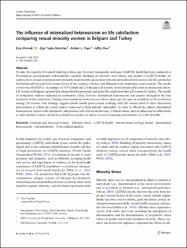Please use this identifier to cite or link to this item:
https://hdl.handle.net/20.500.11779/1520| Title: | The Influence of Internalized Heterosexism on Life Satisfaction: Comparing Sexual Minority Women in Belgium and Turkey |
| Authors: | Toplu-Demirtaş, Ezgi Moe, Jeffry Ummak, Esra Pope, Amber L. |
| Keywords: | Cross-cultural analysis Lesbians and bisexual women Intersectional ecology model Life satisfaction Minority stress Lgbtq health Internalized heterosexism |
| Publisher: | Springer |
| Source: | Ummak, E., Toplu-Demirtaş, E., Pope, A.L. et al. (13 July 2021). The influence of internalized heterosexism on life satisfaction: comparing sexual minority women in Belgium and Turkey. Curr Psychol. pp. 1-12. https://doi.org/10.1007/s12144-021-02068-w |
| Abstract: | To date, the majority of research studying lesbian, gay, bisexual, transgender, and queer (LGBTQ) health has been conducted in Westernized, predominantly individualistic countries. Building on minority stress theory and models of LGBTQ health, we explored how sexual orientation and nationality moderated the association between internalized heterosexism and life satisfaction for lesbian and bisexual (LB) women living in two countries (Turkey and Belgium) with contrasting social contexts. The results of two-way MANOVA, in a sample of 339 Turkish and 220 Belgian LB women, revealed main effects but no interaction effects. LB women in Belgium reported less internalized heterosexism and more life satisfaction than LB women in Turkey. The results of moderation analyses indicated no moderation effect, however internalized heterosexism and country emerged as the best predictors of life satisfaction. Findings were interpreted with a focus on how culture-specific aspects contribute to life satisfaction among LB women. Our findings suggest mental health professionals working with LB women need to tailor therapeutic interventions to reflect the social context connected to their patients’ nationality, in order to effectively address internalized heterosexism, improve life satisfaction, and promote self- and social advocacy. Cultural values, such as adherence to collectivistic or individualistic norms, should be included as variables in future research examining determinants of LGBTQ health. |
| URI: | https://doi.org/10.1007/s12144-021-02068-w https://hdl.handle.net/20.500.11779/1520 |
| ISSN: | 1936-4733 1046-1310 |
| Appears in Collections: | Rehberlik ve Psikolojik Danışmanlık Koleksiyonu Scopus İndeksli Yayınlar Koleksiyonu / Scopus Indexed Publications Collection WoS İndeksli Yayınlar Koleksiyonu / WoS Indexed Publications Collection |
Files in This Item:
| File | Description | Size | Format | |
|---|---|---|---|---|
| Ummak2021_Article_TheInfluenceOfInternalizedHete.pdf | Full Text / Tam Metin | 488.94 kB | Adobe PDF |  View/Open |
CORE Recommender
Sorry the service is unavailable at the moment. Please try again later.
Items in GCRIS Repository are protected by copyright, with all rights reserved, unless otherwise indicated.